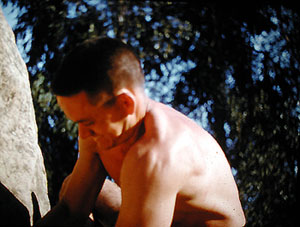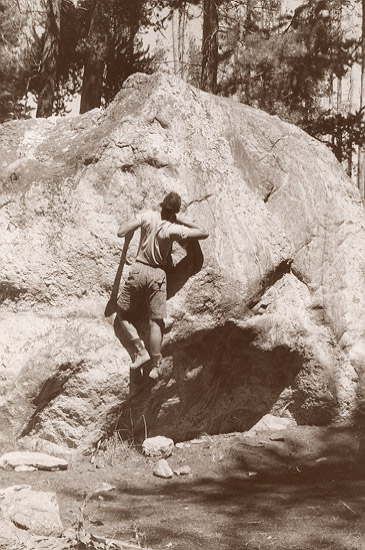www.johngill.net
Bouldering Companions
 Dave Rearick : (David Rearick)
This is a photo of Dave
as a young man in the 1950s bouldering at
Stoney Point (courtesy B. Kamps).
I first met Dave in the late 1950s in Grand Teton
Park. He was then a very well known and highly skilled
California climber who was getting his PhD in mathematics
at Cal Tech. Over several years Dave and I would meet
and boulder together in the Tetons, Black Hills, and Colorado.
He was also a gymnast, and we practised our gymnastics on
a cement slab in the old Climbers Campground near Jenny Lake
in the early 1960s. (There's nary a trace left of the campground,
but the slab is still there if you know where to look - the
Park Service is accomplished at 'disappearing' undesirable
projects.) I remember instructing Dave on the stiff-stiff
press to handstand.
Dave Rearick : (David Rearick)
This is a photo of Dave
as a young man in the 1950s bouldering at
Stoney Point (courtesy B. Kamps).
I first met Dave in the late 1950s in Grand Teton
Park. He was then a very well known and highly skilled
California climber who was getting his PhD in mathematics
at Cal Tech. Over several years Dave and I would meet
and boulder together in the Tetons, Black Hills, and Colorado.
He was also a gymnast, and we practised our gymnastics on
a cement slab in the old Climbers Campground near Jenny Lake
in the early 1960s. (There's nary a trace left of the campground,
but the slab is still there if you know where to look - the
Park Service is accomplished at 'disappearing' undesirable
projects.) I remember instructing Dave on the stiff-stiff
press to handstand.
With the slab as our
inspiration, we conceived a possible Olympic
event we called Tower Jumping (we thought of
this between bouts of frisbee with a large metal
garbage can lid) : a tower with a ladder is erected
beside such a slab and there are landings marked at
each 3 feet. There is a large bullseye painted on the
middle of the slab below. Competitors start at 3 feet and
jump onto the target on the slab. They then have 10 seconds to
remove themselves from the slab. Each competitor moves up the
ladder to the next higher position, and jumps. Once a competitor
is unable to remove himself from the slab, the next lower landing
is determined to be his high point. A gold medal goes to the
athlete having the highest point. It is hoped he/she will be
conscious to receive his/her award. Posthumous medals are a possibility.
 Dave's California
climbing adventures included a landmark first
ascent in 1959 of the Vampire (5.10 + aid)
with Royal Robbins. In 1960, he and Royal climbed
the east chimney of Rixon's Pinnacle – Yosemite's
first 5.10. And in 1960, he and Bob Kamps made
the first ascent of the Diamond on Longs Peak –
a prize many climbers coveted. They were the guests
of honor at a parade in Estes Park that was widely reported
in the news media. In Eldorado Canyon, near Boulder, Dave
and Bob Culp made the first free ascent (5.10) of T-2,
a Kor route. This involved a significant overhang that had
defeated others. In 1964, Dave and Pat Ament climbed
Coffin Crack (5.10-5.11) on Castle Rock near Boulder.
During the late 1950s and early 1960s, Dave and his frequent
climbing partners, Robbins and Kamps, were counted among
the very best rock climbers in America. He was focused and fearless
and had superb and very smooth technique.
Dave's California
climbing adventures included a landmark first
ascent in 1959 of the Vampire (5.10 + aid)
with Royal Robbins. In 1960, he and Royal climbed
the east chimney of Rixon's Pinnacle – Yosemite's
first 5.10. And in 1960, he and Bob Kamps made
the first ascent of the Diamond on Longs Peak –
a prize many climbers coveted. They were the guests
of honor at a parade in Estes Park that was widely reported
in the news media. In Eldorado Canyon, near Boulder, Dave
and Bob Culp made the first free ascent (5.10) of T-2,
a Kor route. This involved a significant overhang that had
defeated others. In 1964, Dave and Pat Ament climbed
Coffin Crack (5.10-5.11) on Castle Rock near Boulder.
During the late 1950s and early 1960s, Dave and his frequent
climbing partners, Robbins and Kamps, were counted among
the very best rock climbers in America. He was focused and fearless
and had superb and very smooth technique.
On Cutfinger Rock, 1960
However, nothing compares to the dangerous
thrill Dave and I got when we tried to
substitute real rocks for a package of rock
candy in the old grocery store at Jenny Lake
in the early 1960s. The two elderly women who ran
the store gave us evil looks and quickly discovered
our deception after we left. On another occasion,
I recall an afternoon we drove to String Lake to go swimming,
with Bill Woodruff, another Cal Tech prodigy
who was bicycling across the USA. Dave and I were sitting
on the beach chatting while Bill floated on an air mattress
about 50 feet out. Dave had a chess board set up and he and
Bill were playing chess, Dave concentrating on the board and
Bill, eyes closed, drifting lazely and calling back his moves.
After a while, Dave, staring at the board, chuckled and said
"he's got me beat!"
Dr. Rearick had a
long, distinguished career as a mathematics
professor at the University of Colorado.
He gained the enviable reputation of being
one of the few profs in the department students really
liked and appreciated. He became a serious bicyclist,
foregoing his car as he moved around Boulder,
and developing such stamina that he was able to bicycle
from Boulder up to the Longs Peak Ranger station, hike
up Longs Peak, then return to Boulder in one day. Dave retired
several years ago. He was one of my most interesting and
intellectual companions, quiet and witty, and I fondly recall
our good times together in the Tetons and elsewhere,
playfully blurring the lines between reality and fantasy.
(2003)